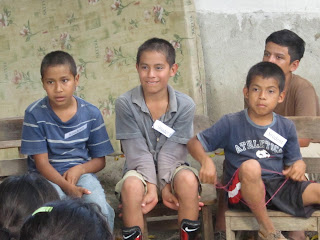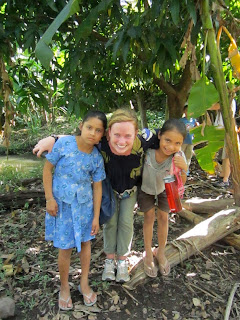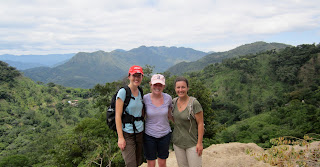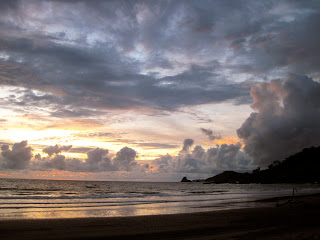By request I am finally posting pictures of where I live and random details about my life here the past few weeks! I am living in an apartment behind the Shoulder to Shoulder clinic with six other people. I share a room with another volunteer Amy who I could not be more thankful for. She is my workout buddy, my dancing partner, and
my sidekick. She is so positive and wonderful to be around! We also live with two other Americans, a Honduran nurse, and a Honduran family (the husband is the accountant for Shoulder to Shoulder and his wife is the dentist).
We have an office and living type space and a kitchen upstairs. There is also an identical apartment right next to ours where the other Honduran nurses and doctors live.
 |
| My bed (complete with my unused mosquito net) |
 |
| Our apartment (the roof of the clinic is in front and my room is the middle one on the left) | | | |
|
|
|
Right now, we have a dental brigade from Ohio State here so it has been nice to have some fresh faces around the clinic. Today we went to a school with them and they handed out toothbrushes, did a demonstration on how to brush teeth properly, and gave fluoride treatments to each student. Shoulder to Shoulder is working on getting fluoride treatments twice a year to all the schools in the area, as a means of prevention rather than reactive dentistry where the dentists just pull teeth. While teeth pulling no doubt still happens a lot (about 1 in every 3 patients), teaching the kids proper dental care is much more sustainable.
It’s official. I survived my first sickness and never have I been so thankful to live at a clinic. We’re talking issues with both ends…. not fun. However, in the morning is all I had to do was walk down the stairs and 5 minutes later I had an I.V. in and medicine in hand. I was only in bed for one day. Thank goodness. However, the same thing came back again so now they are treating me for parasites. Hopefully this will be the last time! It’s times like these when I still want my mom and my nice, warm bed at home but I could not be more thankful for the doctors and my roommates here who took good care of me!
On Saturday was Dia de los Niños. Yep Honduras has a whole day for celebrating kids, they have the right idea if you ask me. This day is even bigger than Christmas for the kids because they get gifts and candy. The Friday before the big day, we walked down to the school where they had games like pin the tail on the donkey, potato sack races, a soccer tournament, and handed out cake. We have been trying to have a celebration at the clinic for the past two days for the kids in the community but there has not been power. At the clinic, we have a generator so we are not hit as hard but because there is still no power in the community, the baker in the town couldn’t make the cakes for the kids. Hopefully we will have it tomorrow (which is also Honduras Independence Day)!
 |
| A potato sack race at the elementary school for Dia de los Niños |
|
|
|
|
One of my favorite things about brigades is meeting the translators. They are usually Honduran males about my age from the coast who have either attended bilingual school or lived in the States. It’s fun to talk in Spanglish with them and while we usually talk in Spanish, it’s nice to have someone who knows English to correct and help me when I need it. They teach me the street lingo and I have to say I am pretty jealous of their bilingual capabilities, I am amazed at how much they know!
 |
| Josh (one of the translators) and me (yes that is a PIKE shirt he has on, apparently I'm still in college) |
The high school in Santa Lucia also has not had school for the past two weeks but various classes finally started up this week. A lot of the teachers have not been paid for months and are now refusing to go to class as a result (can’t blame them). The problem is that if the teachers do not show up to class, then they also jeopardize the students in losing their year of school. Since the school year is from the end of January to November here, if the students don’t finish their last three months of school, they will have to repeat.
Now, only a few of the teachers are attending class (the ones who have been paid) but it is better than nothing and hopefully the government will come around soon as I have been told that is something that happens every year.
 |
| The girls in the Yo Puedo program (I swear they are usually happy) with their crocheted napkins that they sell for 100 lempiras (5 dollars) as a part of a microfinance project to support their school |
Life here continues to be slow and calm yet new and unexpected everyday. September and October are the “coolest” months of the year (which still means high 80s with lots of humidity) so I have been enjoying the fog and the rain everyday and am trying to soak it up before the dry season comes in November! I am keeping busy with the education program (we are planning expansion into two other communities) so this means a lot of collaboration between the States and Honduras and I'm also keeping busy with brigade planning and other random tasks as well (my next brigade comes in November). I hope this finds you all well and enjoying the start of fall!












































